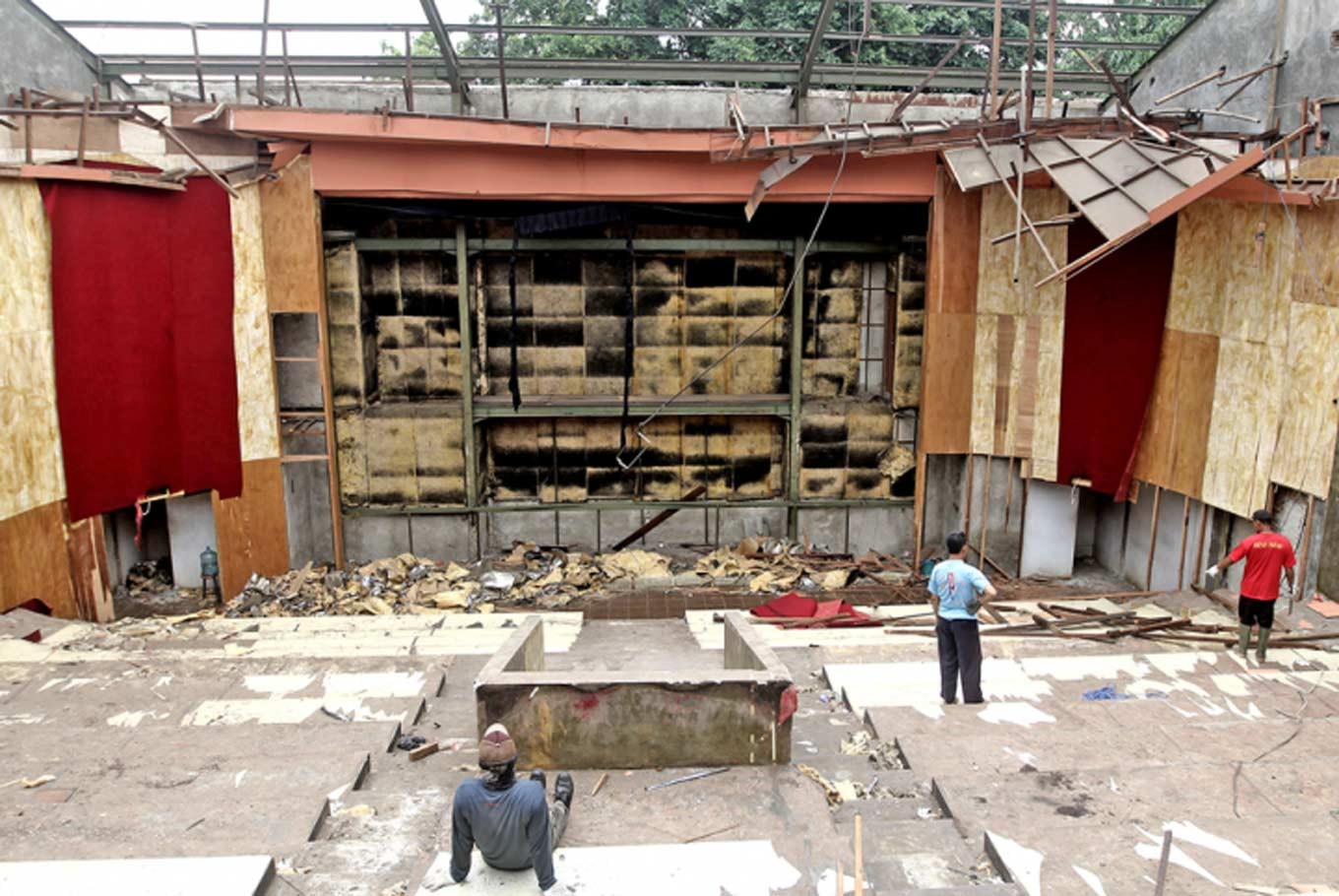Popular Reads
Top Results
Can't find what you're looking for?
View all search resultsPopular Reads
Top Results
Can't find what you're looking for?
View all search resultsClosure marks end of analog film projector era
Buaran Theater in Duren Sawit, East Jakarta, which peaked in the 1990s and early 2000s, has been torn down, ending the era of analog movie projectors in Jakarta.
Change text size
Gift Premium Articles
to Anyone
B
uaran Theater in Duren Sawit, East Jakarta, which peaked in the 1990s and early 2000s, has been torn down, ending the era of analog movie projectors in Jakarta.
Affectionately dubbed Butet, the theater was the last one in the capital to use a 35-millimeter film projector after Grand Theater in Senen, Central Jakarta, closed down earlier this year due to a major shift toward digital projectors.
After 28 years of entertaining movie buffs, Butet was torn down on Nov. 25, leaving its jobless attendants to scavenge through the dismantled building’s remains.
They are paid Rp 135,000 (US$9.98) a day for collecting left-over materials, including parts of the ceiling, slabs of steel, pieces of wood and theater chairs.
In the second week of December, what remains of the theater is set to be demolished by backhoes. The 3,600-square-meter plot of land will reportedly be turned into a car dealership next year.
Movie projectionist Agus Salim Zebua, 55, could not hide his sadness while talking about the theater, where he had spent the last 20 years serving moviegoers.
Some moments he would never forget, he said, including the time when long queues stretched outside Butet for screenings of Ayat-Ayat Cinta (Verses of Love) in 2008.
“There was a man standing in the middle of the queue asking me to help him buy tickets for five people. I said ‘no’ to him because the theater never allowed calo [ticket scalpers] on the premises,” Agus said on Saturday.
At that time, Butet’s four studios were able to accommodate thousands of moviegoers each day, he said.
However, the theater’s popularity did not last long after the arrival of digital projectors, which produced better quality films.
Agus said Butet’s owner decided not to procure the digital projectors because they were too expensive, adding: “The owner would have had to spend about Rp 5 billion to buy projectors for four studios.”
As a result, for the past few years, the theater had been unable to show movies produced after 2014, and its customer base dwindled to as low as 10 viewers per day.
With weekday tickets priced at only Rp 10,000 and weekend tickets costing Rp 15,000, Butet suffered a monthly deficit of about Rp 30 million.
In comparison, other independent movie theaters charged Rp 40,000 for tickets.
Butet’s workers stopped getting pay raises in 2012, leaving them with a monthly salary that was below the current provincial minimum wage (UMP) of Rp 3.5 million, Agus said, adding that the only hope of the remaining 22 employees was to receive their pensions from the company.
Helmi Syarif, 34, a resident of Rawamangun, East Jakarta, lamented Butet’s closure.
“The theater is so memorable to high school students from the 90s. Some schools in East Jakarta held screenings to watch Fatahillah in the theater,” Helmi said, referring to the Indonesian epic released in 1997.
Students would also play arcade games in the theater after school, he said.
But not everyone had the same nostalgic fondness of Butet.
South Jakarta resident Nursita, 22, supported its closure.
In 2013, Nursita recalled watching Moga Bunda Disayang Allah (May Allah Love Mother) with two of her friends in Butet, the only theater in Jakarta that was still showing the movie.
“The theater was so dark and smelled musty,” Nursita said.
“If [its owners] wanted to attract more visitors, they should have improved the theater’s conditions.”
Okinawan Agni Mulyono, founder of a community of old movie theater enthusiasts, said he hoped to see the re-emergence of theaters that screened celluloid movies.
These classic movies would not only entertain people, but also serve as educational subjects for movie buffs and aspiring filmmakers, he said.
However, such theaters should also provide comfort for moviegoers, he added.











